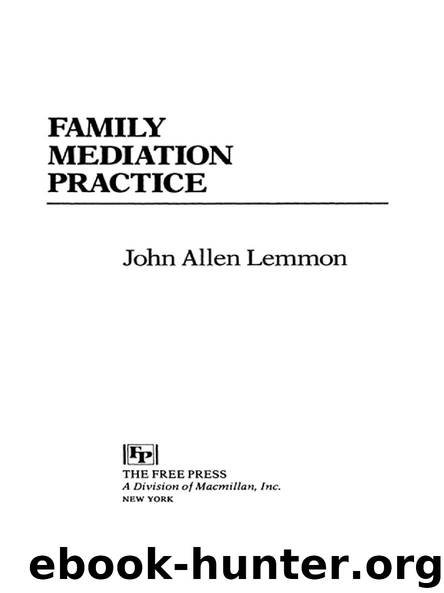FAMILY MEDIATION PRACTICE by John Allen Lemmon

Author:John Allen Lemmon
Language: eng
Format: epub
Tags: SOC035000
Publisher: The Free Press
Published: 1985-07-15T00:00:00+00:00
Remarried Families
Remarried persons may treat a new spouse according to assumptions formed in previous relationships. They may also be paying child and/or spousal support and sharing custody of any children. The remarried family tends to move through four stages, taking at least four years to do so (“Stepfamilies,” 1983).
Fantasy. At first, both adults think that since they have found the right mate, this marriage will be successful. New stepparents may think that either the children will not be a problem, because they will not be involved significantly in the new relationship, or that they will be living exclusively in the new family, without any interference or entanglements from their other biological parent. Children may like the new person but be worried about what’s going to happen with their other parent. They may feel disloyal. They may resent having to share their parent with another adult if they had them all to themselves before.
Pretending. When reality begins to intrude upon it, the remarried family will at first tend to ignore any indications that its fantasies are not entirely accurate. In both the fantasy phase and the pretending phase, families will seldom seek outside help.
Panic. About two years after the marriage, the spouses begin to confront what they really need. As Judy Osborn says, “Many adults are desperate to make a second partnership work and they’re desperately afraid to get into conflicts again. Another broken relationship will bring further loss to adults and children. Conflict means divorce to many” (“Stepfamily,” 1983, p. 3). She suggests that this is the point when issues that were disregarded during the fantasy phase are consciously confronted. “Perhaps I don’t want to rescue any child. Maybe I don’t like her children. Maybe the ex-spouse was right to leave” (p. 3). This may be when family mediation is sought.
Conflict Resolution. Osborn suggested that the issues in conflict must be identified before they can be considered in terms of both the fantasies the family has been working under as well as what they feel they individually need. Only then can they move on to accept their losses and gains.
Download
This site does not store any files on its server. We only index and link to content provided by other sites. Please contact the content providers to delete copyright contents if any and email us, we'll remove relevant links or contents immediately.
| Clergy | Devotionals |
| Faith | Inspirational |
| Meditations | Monasticism & Asceticism |
| Prayer | Prayerbooks |
| Ritual | Sermons |
The Secret Power of Speaking God's Word by Joyce Meyer(3159)
More Language of Letting Go: 366 New Daily Meditations by Melody Beattie(3017)
The Holy Spirit by Billy Graham(2938)
To Light a Sacred Flame by Silver RavenWolf(2810)
Tuesdays With Morrie by Mitch Albom(2748)
The Lost Art of Good Conversation by Sakyong Mipham(2638)
The Traveler's Gift by Andy Andrews(2447)
Kundalini by Gopi Krishna(2177)
A Kingsbury Collection by Karen Kingsbury(2091)
Anxious for Nothing by Max Lucado(1966)
Finding Chika by Mitch Albom(1964)
Angels of God: The Bible, the Church and the Heavenly Hosts by Mike Aquilina(1951)
Angels by Billy Graham(1917)
As a Man Thinketh by James Allen(1897)
Curse Tablets and Binding Spells from the Ancient World by Gager John G.;(1858)
The Yoga of Jesus: Understanding the Hidden Teachings of the Gospels by Paramahansa Yogananda(1845)
Barking to the Choir by Gregory Boyle(1817)
Autobiography of a Yogi (Complete Edition) by Yogananda Paramahansa(1809)
How To Be Born Again by Billy Graham(1775)
